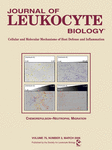-
Views
-
Cite
Cite
Atilla Yilmaz, Christine Reiss, Alexander Weng, Iwona Cicha, Christian Stumpf, Alexander Steinkasserer, Werner G Daniel, Christoph D Garlichs, Differential effects of statins on relevant functions of human monocyte-derived dendritic cells, Journal of Leukocyte Biology, Volume 79, Issue 3, Mar 2006, Pages 529–538, https://doi.org/10.1189/jlb.0205064
Close - Share Icon Share
Abstract
Statins were shown to possess immunomodulating properties, but the mechanisms of statin effects on the immune system are poorly understood. We analyzed the influence of statins on professional antigen-presenting dendritic cells (DC). Immature DC were cultivated from monocytes of healthy donors. DC maturation was induced by lipopolysaccharide (LPS; 1 μg/mL). Unstimulated and LPS-stimulated DC were treated with simvastatin or atorvastatin (0.1–1 μM). The expression of CD40, CD83, CD86, and human leukocyte antigen-DR on unstimulated and LPS-stimulated DC was reduced significantly by statins, and the expression of Toll-like receptor 2 (TLR2) and TLR4 on LPS-stimulated DC was enhanced temporarily. Statins caused a significant reduction of endocytosis of fluorescein isothiocyanate-dextran by DC. Statins significantly inhibited the basal secretion of interleukin (IL)-6, IL-8, IL-12, and tumor necrosis factor α from unstimulated DC, and their release from LPS-stimulated DC was enhanced. In mixed leukocyte reaction, preincubation of LPS-stimulated DC with statins significantly suppressed their clustering with T cells and their ability to induce T cell proliferation, CD71, and CD25 up-regulation on T cells and the secretion of interferon-γ and IL-2 from T cells. In conclusion, this study showed that statins suppressed endocytosis, basal secretion of proinflammatory cytokines, and the ability of DC to induce T cell proliferation, activation, and T helper cell type 1 differentiation. However, statin preincubation of LPS-stimulated DC caused a further increase in their secretion of proinflammatory cytokines.





